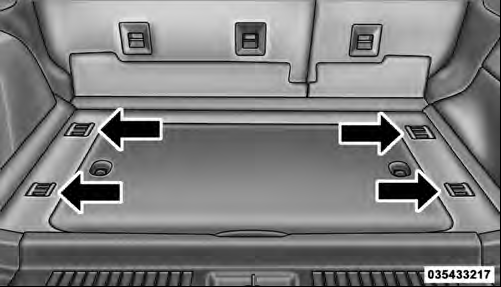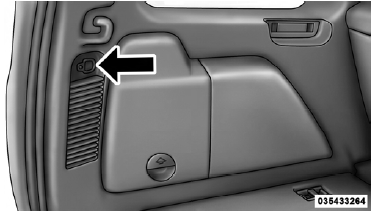Cargo Tie-Down Hooks And Loops
The tie-downs located on cargo area floor should be used to secure loads safely when the vehicle is moving.

Cargo Tie-Down Hooks

Cargo Tie-Down Loops
Cargo tie-down loops are located on the trim panels.
WARNING!
• Cargo tie-downs are not safe anchors for a child
seat tether strap. In a sudden stop or accident, a
tie-down could pull loose and allow the child seat
to come loose. A child could be badly injured. Use
only the anchors provided for child seat tethers.
• To help protect against personal injury, passengers should not be seated in the rear cargo area. The rear cargo space is intended for load carrying purposes only, not for passengers, who should sit in seats and use seat belts.
The weight and position of cargo and passengers can change the vehicle center of gravity and vehicle handling. To avoid loss of control resulting in personal injury, follow these guidelines for loading your vehicle:
• Do not carry loads that exceed the load limits described on the label attached to the left door or left door center pillar.
• Always place cargo evenly on the cargo floor. Put heavier objects as low and as far forward as possible.
• Place as much cargo as possible in front of the rear axle. Too much weight or improperly placed weight over or behind the rear axle can cause the vehicle to sway.
Do not pile luggage or cargo higher than the top of the seatback. This could impair visibility or become a dangerous projectile in a sudden stop or accident.
See also:
System Status
Displays SYSTEM OK if there are no active Warning Messages stored. Pressing and
releasing the DOWN button when SYSTEM OK is displayed will do nothing.
Displays SYSTEM WARNINGS PRESENT if there are ...
Towing This Vehicle Behind Another Vehicle
...
Service Contract
You may have purchased a service contract for a vehicle to help protect you from
the high cost of unexpected repairs after the manufacturer’s New Vehicle Limited
Warranty expires. The manufactur ...


